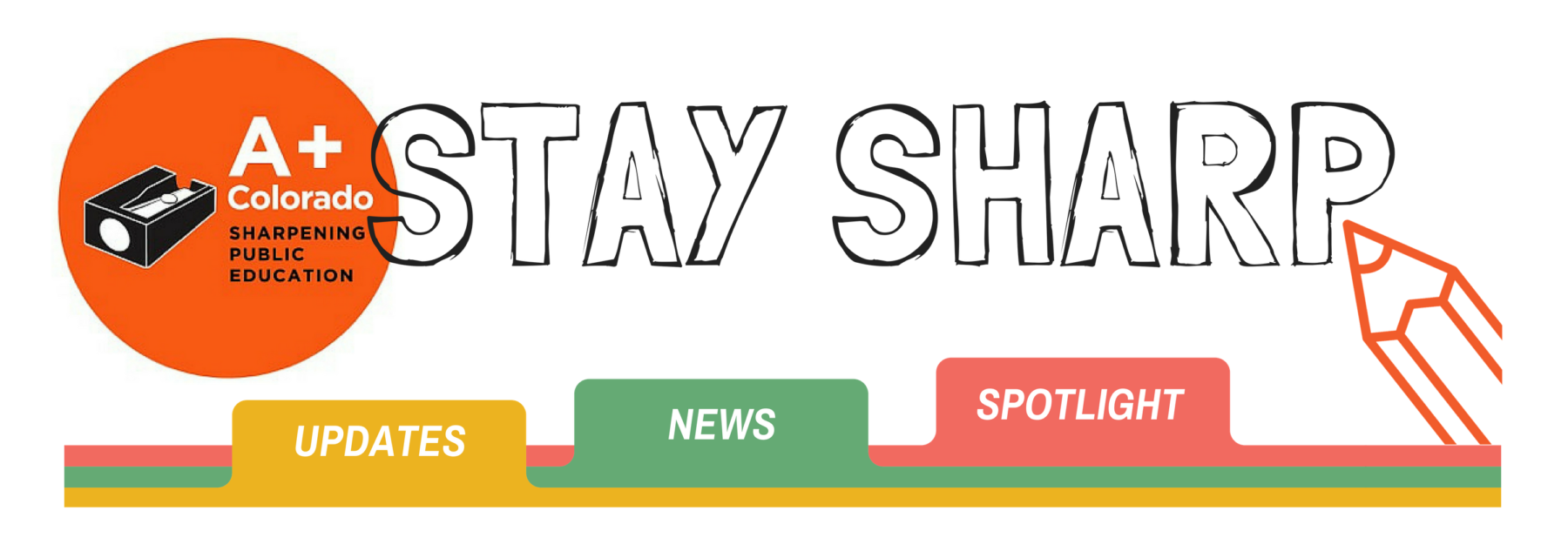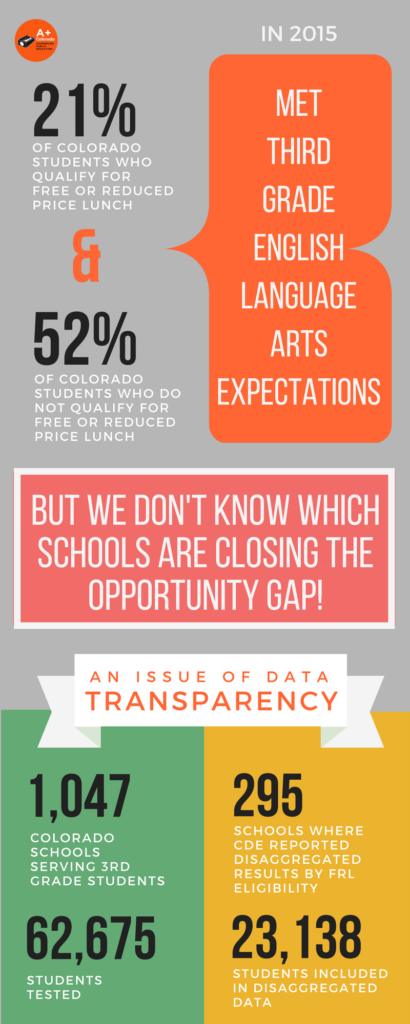A+ Updates
In need of some summer reading? Catch up on local education facts from A+:
- The Outliers: The State of Colorado School Districts
- Start with the Facts: Aurora Public Schools
- Start with the Facts: Denver Public Schools
News to Share
Moving Forward on School Restart
Following the closure of Greenlee Elementary and Amesse elementary, the DPS School Board voted Monday to “restart” these schools, which will now be the Center for Talent Development at Greenlee and the Montbello Children’s Network respectively. The decision comes after an eight-month process that identified the persistently low-performing schools for a new program, solicited applications from school leaders, and worked with the community to review and recommend applicants. The two school leaders now have a year to fully plan the new program, recruit staff, engage their school community and other partners, and will open the new school in 2018-2019. With the decision made, and DPS set to continue implementation of the School Performance Compact that identifies schools for restart, it is now time to reflect on the process, and incorporate learnings going forward. Some questions that we’re asking include:
- How can DPS make the review process more accessible to school community members? Does the current review process sufficiently meet families where they are and empower them to engage in the process? The fact that there were no parents who were part of the final community review vote seems to indicate that there is still work to do on this front. This is particularly critical as Superintendent Boasberg and the Board made clear, with their recommendation and vote respectively, that community determination will be central to future restart processes.
- How can DPS both solicit more high quality applications (only one application at Greenlee met DPS’ quality bar), and ensure that the work that goes into the development of high quality applications is not abandoned when the school is not selected? There are many schools across the city that could benefit from the new programs developed in response to the restart call. Is there a way to connect new school options with other school communities who are in need of high quality programs?
- Has DPS developed a core competency around elementary school turnaround? This restart selection process indicates that the district has greatly improved on this front. The results from last-year’s “Year 0” turnaround schools (Goldrick, Schmidt, Harrington, and Valverde) will also be telling. What other practices and changes should DPS be pursuing to support turnaround efforts? Does this competency extend to other levels?
- How can DPS manage the tension between being both an operator (with district-supported applicants for restart providers) and a portfolio manager?
- How will next year’s process look different? Are there formal and informal opportunities for staff, applicants, families, and communities to weigh in and shape changes to the process?
In APS, a Resolution and an Opportunity
On May 15, the Aurora Public School Board passed a resolution in support of undocumented students that the district serves. The resolution ultimately passed unanimously, yet not before Aurora School Board Director Cathy Wildman made multiple anti-immigrant statements at the meeting. The resolution brought before the school board should not have been controversial, Denver and many other school districts passed similar resolutions without controversy. The resolution, crafted by APS students and families convened through RISE Colorado, is a response to the increased fear and confusion facing refugee and immigrant students under the current presidential administration. It clarifies the district’s existing policies on communicating with Customs and Immigration Enforcement (ICE), directs the district to translate and share their policies, and reaffirms the need for emergency contacts in case a family member cannot pick up a child. A+ Colorado and other community members responded to Wildman’s anti-immigrant statements with a blog, a letter to the editor, and public comment.
DSST Gets the Green Light
After a final contentious discussion of the merits of bringing DSST to APS, the Aurora Public Schools Board of Education voted 5-2 to approve DSST’s charter application. Several APS students who choiced out of the district to attend DSST’s Denver campuses spoke to the board about their experiences at DSST and their support for the network’s expansion into APS. Students in Aurora have a dearth of quality options, especially students living in Northwest Aurora where DSST will open its first campus. After some critiques of the early stages of DSST’s entrance to Aurora, the charter network made sure to spend time working with community groups and leaders to ensure that the DSST campuses in Aurora reflect the needs of the community. The district’s Office of Autonomous Schools has also worked to create clearer systems to address the perceived unfairness in the DSST process. The board’s vote on June 20th demonstrates their support for bringing in quality options. Now, the district and board have to continue the work of creating clearer systems, engaging community in these decision-making processes, and providing quality school options whether they are district-led, innovation or charter schools.
Stronger Neighborhoods, Inclusive Schools?
DPS’ newest initiative, Strengthening Neighborhoods, brings together a committee to discuss how to address school segregation, and increase integration and inclusion in Denver schools as major shifts in demographics, housing, and school enrollment continue to occur across the city. In our most recent report on DPS we offer strategies to address gentrification patterns and to push for equitable access to high quality programming including reserving seats for low-income students at schools with more affluent attendance boundaries; creating diverse-by-design schools; improving transportation options for low-income students and students living in neighborhoods without high quality schools. As the Strengthening Neighborhoods committee explores these and other options, we hope the conversation moves beyond ideas of integration as an end in and of itself, to ideas of inclusion where schools create a sense of belonging and equal outcomes for students of different groups within diverse school communities. We are looking forward to, and plan to focus our coming work on, a more nuanced understanding of strategies to improve integration and equitable access to diverse high-quality programs.
How Equitable are Colorado Schools?
This question, central to improving our state’s education system, is currently unanswerable. Education Cities and GreatSchools released the 2017 Education Equity Index on 213 of America’s largest cities (a new methodology this year addressed the concerns we raised with last year’s release), which identifies schools and cities where students from low-income families are mastering grade-level standards at the same or higher rate than their more affluent peers. But only one city in Colorado, and about 60% of included Colorado schools, are assigned a score. The reason? Unavailable data.
The Index is based on 2015 disaggregated proficiency-level data by free or reduced price lunch eligibility. The Colorado Department of Education did release this data in the summer of 2016. Yet 67% of the ELA and 76% of the Math district and school-level disaggregated data was masked. For example, of over 1,000 schools serving 3rd graders, we know about gaps between students who receive free or reduced price lunch and those students who do not receive free or reduced price lunch in fewer than 300 of them. This isn’t to mention the fact that there has still been no disaggregated data release of proficiency-level data from 2016.
This data suppression compromises families, communities, educators, and policymakers’ understandings of what is and is not working in schools and for which students, raising not only practical but civil rights concerns.
Fellowship Opportunities
Looking to engage more deeply in education policy discussions? Applications for several fellowships are currently open:
- Colorado Education Policy Fellowship Program (EPFP): Colorado EPFP is a partnership of the Washington D.C. based Institute for Educational Leadership (IEL) and the School of Public Affairs (SPA) at the University of Colorado at Denver. Targeted at individuals who hold full-time positions in diverse organizations focused on education and children at the local, state, and national levels, Fellows develop a broadened understanding of the policy process and the various aspects of education policy; and enhance their communication, decision-making and leadership skills.
- Teach Plus Colorado Teaching Policy Fellowship: The Teach Plus Colorado Teaching Policy Fellowship is a highly selective leadership opportunity for outstanding Colorado teachers looking to deepen their knowledge of education policy and gain a voice in decisions that affect students and the teaching profession. Teach Plus trains teachers in: understanding education policy as a lever for student success, community organizing, writing op-eds and speaking to the media, providing public testimony, and more.
Spotlight: Colfax Community Network
Summer vacation brings to mind sunshine-filled days, ice cream trucks, afternoons at the pool and “summer slide.” Opportunities for learning and enrichment are often most accessible to students from affluent families. Colfax Community Network (CCN), an organization serving students and families experiencing homeless or unstable housing in Aurora through trauma-informed programming and support, seeks to change that. At CCN’s summer school, students enjoy all of the things that make summer great: hiking, swimming lessons, and at the end of it all, a camping trip. What sets CCN apart is their dedication to providing students and families with experiences that offer dignity, community, and inclusion. At the same time that students enjoy camp, CCN supports families who are navigating price increases at King’s Inn, which houses many families who struggle to find stable housing. Aurora kids and families living in the motels on Colfax have great advocates and supporters at CCN, both during the school year and the summer break.
A+ in the News
Do Mandatory Evaluations Contribute To Colorado’s Teacher Shortage?, KUNC
APS board member: Allegations she made racist remarks about illegal immigration policy are politically motivated, Aurora Sentinel
Keeping up as Denver Public Schools keep getting better, Fordham Institute
Six Years In, Colorado’s Teacher Evaluation Program Has Changed The Performance Conversation, CPR
What one principal learned from daily classroom visits, brain science and a paperwork mistake, Chalkbeat
Opinion: A+ Colorado fails APS, Rangeview Raider Review
[5/9] For Our Future: This Week’s Education News & More, New Mexico Education


